The ‘great reset’ meets the Internet of Bodies: manipulating human behavior with authoritarian surveillance
Nov 18 2022
Contact tracing is not just for tracking viruses, it’s a social credit tool for monitoring a nation’s deplorables: perspective
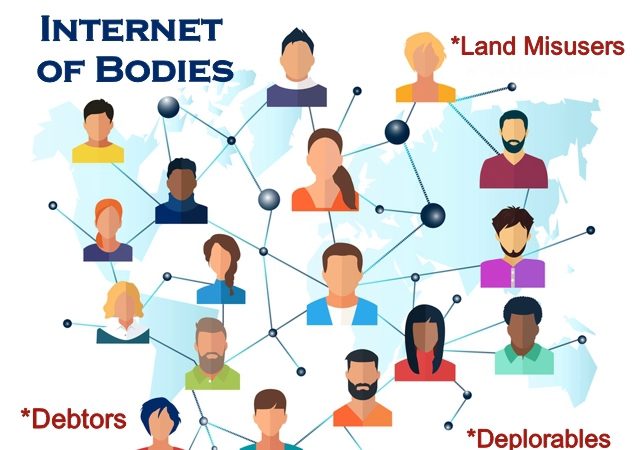
As the networking of humans and machines shows to have incredible promise towards improving overall health and well being for generations to come, the Internet of Bodies (IoB) also runs the risk of enabling a global surveillance state, the likes of which the world has never seen.
The Internet of Bodies “might trigger breakthroughs in medical knowledge […] Or it might enable a surveillance state of unprecedented intrusion and consequence” — RAND Corporation report
Following the launch of its “great reset” agenda, the World Economic Forum (WEF) made a push for the global adoption of the IoB, which risks enabling an authoritarian surveillance apparatus that can manipulate human behavior to achieve its desired outcomes.
According to a recent RAND corporation report, the IoB “might trigger breakthroughs in medical knowledge […] Or it might enable a surveillance state of unprecedented intrusion and consequence.”
The IoB ecosystem is part of the Fourth Industrial Revolution that the World Economic Forum (WEF) wishes to harness for its “great reset” agenda.
“One silver lining of the pandemic is that it has shown how quickly we can make radical changes to our lifestyles […] Populations have overwhelmingly shown a willingness to make sacrifices” — Klaus Schwab, WEF Director
Conceived over five years ago and launched in June, 2020, the so-called great reset agenda promises to give us a “better world” of more sustainability and equity if we agree to “revamp all aspects of our societies and economies, from education to social contracts and working conditions.”
Such radical changes would require a complete shift in our thinking and behavior, and what better way to modify our behavior than to monitor every move we make through a connected network of digital tracking devices?
According to RAND, “Greater connectivity and the widespread packaging of IoB in smartphones and appliances—some of which might collect data unbeknownst to the user—will increase digital tracking of users across a range of behaviors.”
“Increased IoB adoption might also increase global geopolitical risks, because surveillance states can use IoB data to enforce authoritarian regimes” — RAND Corporation report
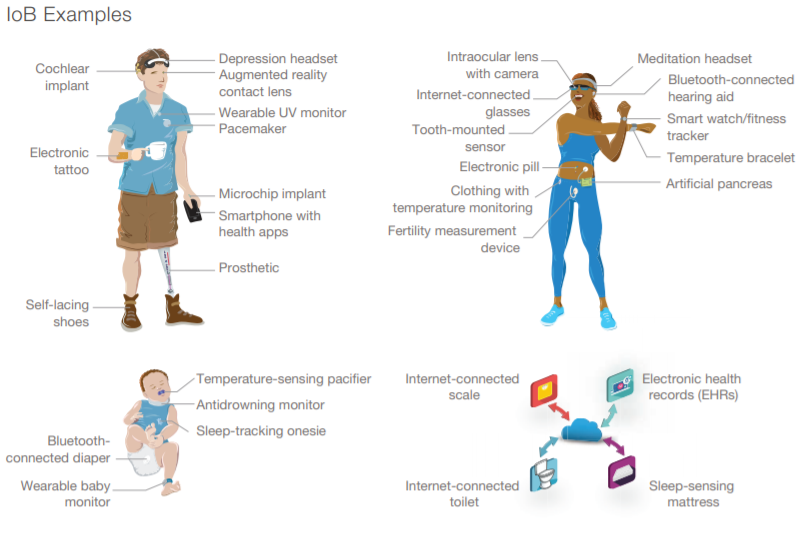
The WEF is fully behind widespread adoption of the IoB despite recognizing the enormous ethical concerns that come with having “an unprecedented number of sensors attached to, implanted within, or ingested into human bodies to monitor, analyze, and even modify human bodies and behavior.”
“It’s now time for the Internet of Bodies. This means collecting our physical data via devices that can be implanted, swallowed or simply worn, generating huge amounts of health-related information” — Xiao Liu, WEF
Knowing that the Internet of Bodies can be used to control human behavior while gaining access to the most sensitive health, financial, and behavioral data of every person on the planet, the Davos elite “urges stakeholders from across sectors, industries and geographies to work together to mitigate the risks in order to fully unleash the potential of the IoB,” according to a WEF report from July, 2020.
“After the Internet of Things, which transformed the way we live, travel and work by connecting everyday objects to the Internet, it’s now time for the Internet of Bodies,” wrote Xiao Liu, Fellow at the WEF’s Center for the Fourth Industrial Revolution.
“This means collecting our physical data via devices that can be implanted, swallowed or simply worn, generating huge amounts of health-related information.”
If you think that the idea behind contact tracing apps is just for tracking people infected by viruses, think again
But while having “access to huge torrents of live-streaming biometric data might trigger breakthroughs in medical knowledge or behavioral understanding,” the RAND Corporation warns that the IoB could also “enable a surveillance state of unprecedented intrusion and consequence.”
According to RAND, “Increased IoB adoption might also increase global geopolitical risks, because surveillance states can use IoB data to enforce authoritarian regimes.”
For example, this is the same ecosystem that is allowing the Chinese Communist Party (CCP) to collect DNA data from its Uyghur population, so the authoritarian regime can further spy on, imprison, and sterilize an entire ethnic minority, among other horrible atrocities.
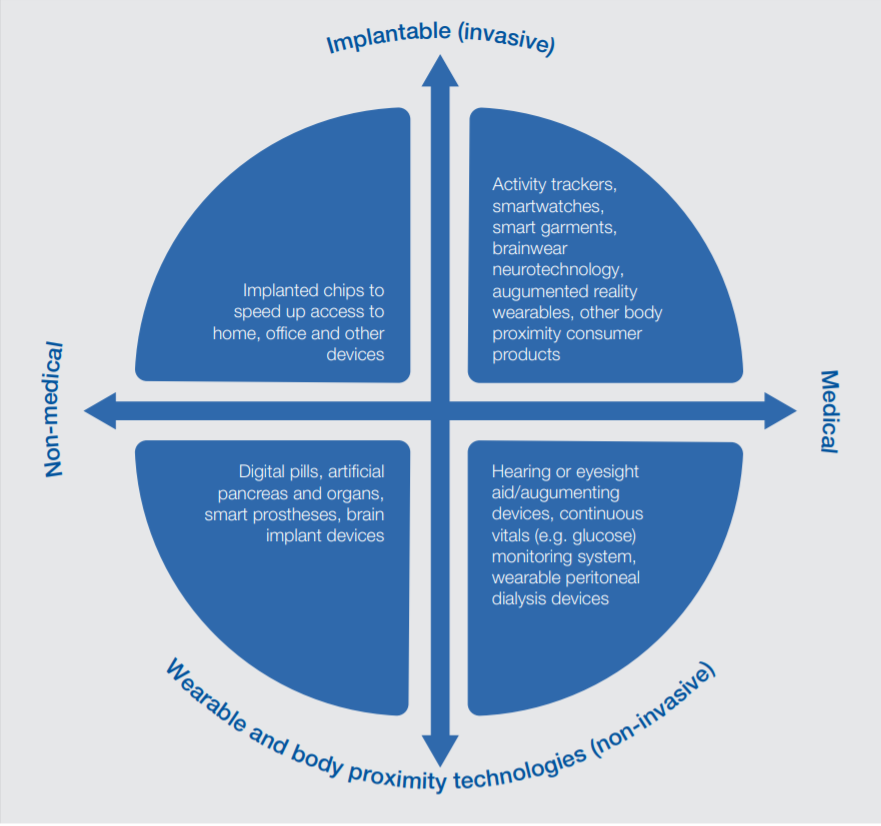
But if you want to see how the IoB fits into a great reset, like the one the WEF is touting, look no further than China’s social credit system that “uses enormous amounts of aggregated data, including health records, on individuals to determine their trustworthiness and to incentivize desired behaviors,” according to RAND.
A population that knows it is being watched will change its behavior to conform to the norms, and its citizens will police themselves.
Thus, the IoB is a tool that can serve multiple purposes — it can revolutionize healthcare for the benefit of all; it can be used to monitor, track, and prevent global crises before they manifest, and it can be turned into an apparatus for manipulating human behavior in order to achieve the desired outcomes of the global elite.
Contact tracing is also a tool for complete social control, keeping tabs on a nation’s so-called deplorable or undesirable citizens.
Think social justice policing via contact tracing — not just through mobile phones, but tracking chips implanted in the human body.
Today, the WEF is fully behind the use of the IoB, and actively supports digital health passports (CovidPass) and contract tracing apps (CommonPass).
If you think that the idea behind contact tracing apps is just for tracking people infected by viruses, think again.
The same technology was used by the CCP to develop an app that literally alerts citizens with a warning when they come within 500 meters of someone who is in debt.
“The app has created what’s essentially a map of ‘deadbeat debtors,’ according to Chinese state media, and shows you the debtor’s exact location, though it’s unclear if the displayed information includes a name or photo.”
So, while the WEF urges greater IoB use and contact tracing, the technology is not just for tracking the spread of a virus.
Contact tracing is a superb tool for total social control keeping tabs on a nation’s so-called deplorable or undesirable citizens.
Think social justice policing via contact tracing — not just through mobile phones, but tracking chips implanted in the human body.
“Widespread IoB use might increase the risk of physical harm, espionage, and exploitation of data by adversaries” — RAND Corporation report

The RAND report also warned that “widespread IoB use might increase the risk of physical harm, espionage, and exploitation of data by adversaries.”
“You no longer need to be MI6 and issued a Walther PPK in order to assassinate someone; you just need to gain access to their medical devices” — Richard Staynings, Cylera
Indeed, if state-sponsored hackers or criminal organizations were to gain access to a medical device used by a high-profile target, the hackers could simply switch it off and assassinate their target.
As Richard Staynings, Chief Security Strategist at Cylera, once told The Sociable, “You no longer need to be MI6 and issued a Walther PPK in order to assassinate someone; you just need to gain access to the medical devices that are keeping that individual alive.”
On top of the geopolitical risks, the RAND report warned that the IoB could also “increase health outcome disparities, where only people with financial means have access to any of these benefits.”
However, this seems an unlikely scenario because the WEF doesn’t like to see one nation gain too much power. It prefers balance. It wants every country to follow the rules. It wants a technocratic Utopia.
“Authoritarianism is easier in a world of total visibility and traceability, while democracy may turn out to be more difficult” — WEF report
As such, the WEF would like to see the IoB regulated uniformly across the globe, and the Davos elite routinely call for its ethical governance, but that doesn’t mean the surveillance would go away.
Not at all.
It just means that everybody would be spied on equally after having consented to the Draconian measures dressed-up as serving the greater good.
At its heart, the IoB is dependent upon collecting tons of biometric data, which will “allow new forms of social control,” according to the WEF Global Risks 2019 report.
The WEF concluded two years ago that “authoritarianism is easier in a world of total visibility and traceability, while democracy may turn out to be more difficult.”
Now, the WEF wants to exploit the Fourth Industrial Revolution under the great reset agenda, and it has massive support from the media, world leaders, and captains of industry alike.
Klaus Schwab, founder and director of the WEF, had already called for the great reset back in 2014 (see video above), but decided in June, 2020, that this was the year to enact the scheme because the coronavirus crisis had presented a “rare but narrow window of opportunity.”
And in order to make the Davos elites’ globalist Utopia a reality, universal trust in the increasingly invasive uses of emerging technologies will be required.
If you are willing to believe that a global, un-elected body of bureaucrats based in Switzerland has your best interest at heart, then you are willing to accept that your corporeal autonomy, physical privacy, and mental freedom may be compromised to serve the greater good.
G20 promotes vaccine passports for future pandemic response
Vaccine passports have already laid the foundation for a different threat to humanity: perspective

The G20 promotes vaccine passports for future pandemic response following recommendations from the B20 Summit.
On the heels of the Business 20 (B20) Summit in Bali where Indonesian Health Minister Budi Gunadi Sadikin called for a “digital health certificate using WHO standards,” the Group of Twenty (G20) called for international collaboration to capitalize on the success of “digital COVID-19 certificates” for future pandemic response.
“We support […] efforts to strengthen prevention and response to future pandemics that should capitalize and build on the success of the existing standards and digital COVID-19 certificates” — G20 Bali Leaders’ Declaration, 2022
“We acknowledge the importance of shared technical standards and verification methods, under the framework of the IHR (2005), to facilitate seamless international travel, interoperability, and recognizing digital solutions and non-digital solutions, including proof of vaccinations,” reads paragraph 23 of the G20 Bali Leaders’ Declaration.
“We support continued international dialogue and collaboration on the establishment of trusted global digital health networks as part of the efforts to strengthen prevention and response to future pandemics, that should capitalize and build on the success of the existing standards and digital COVID-19 certificates.”
“We acknowledge the importance of shared technical standards and verification methods […] to facilitate seamless international travel, interoperability, and recognizing digital solutions and non-digital solutions, including proof of vaccination”

“Endeavour to move towards interoperability of systems including mechanisms that validate proof of vaccination” — G20 Bali Update, 2022
In separate but similar document, the G20 issued an update that adds:
“Endeavour to move towards interoperability of systems including mechanisms that validate proof of vaccination, whilst respecting the sovereignty of national health policies, and relevant national regulations such as personal data protection and data-sharing.”
The G20’s support for digital health certificates that include proof of vaccination, aka vaccine passports, follows recommendations coming out of the B20 Summit earlier this week.
“Adopt the Digital Documentation of COVID-19 Certificates” — B20 Policy Recommendation, 2022
According to the 132-page B20 Indonesia 2022 Final Communique: Policy Recommendations to the G20, member countries should “Promote further exchanges and strategic use and sharing of science, technology, and appropriate data for crisis detection, creating global coordination framework for future crisis mitigation.”
Those policy recommendations include, but are not limited to:
- Adopting the Digital Documentation of COVID-19 Certificates
- Creating robust guidelines on health emergency preparedness to ensure global coordinated response for future crises enhanced by a technology-enabled “always-on” global health infrastructure
- Implementing and extending the mutual recognition of COVID-19 vaccines
The B20 is the official G20 dialogue forum with the global business community and is tasked with formulating policy recommendations on designated issues.
On the first day of the B20 Summit, Indonesia’s Minister of Health Budi Gunadi Sadikin said that G20 countries should adopt a “digital health certificate using WHO standards” and that they were looking to introduce this type of vaccine passport into the “international health regulations” during the next World Health Assembly in Geneva.
“Let’s have a digital health certificate acknowledged by WHO — if you have been vaccinated or tested properly — then you can move around” — Budi Gunadi Sadikin, Indonesian Health Minister, B20 Summit 2022
“G20 countries have agreed this digital certificate using WHO standard, and we will sub it into the next World Health Assembly in Geneva as the revision to international health regulation” — Budi Gunadi Sadikin, Indonesian Health Minister, B20 Summit 2022
“Let’s have a digital health certificate acknowledged by WHO — if you have been vaccinated or tested properly — then you can move around,” said the Indonesian health minister.
“For the next pandemic, instead of stopping the movement of the people 100 percent […] you can still provide some movement of the people.
“Indonesia has achieved, G20 country has agreed, this digital certificate using WHO standard, and we will sub it into the next World Health Assembly in Geneva as the revision to international health regulation.
“Hopefully for the next pandemic, we can still see some movement of the people, some movement of the goods, and movement of the economy,” Sadikin concluded at the B20 Summit.
Prior to becoming Indonesia’s Minister of Health, Sadikin worked in high-level positions at Bank Bali, Bank Mandiri, ABN AMRO Bank Indonesia, PT Bank Danamon, and IBM.
“A health pass based solely on individual vaccination status may increase the risk of disease spread” — World Health Organization, August 2021
In August, 2021, the World Health Organization (WHO) published a 99-page guide book on the implementation of digital documentation of COVID-19 certificates, aka vaccine passports, stating that “a health pass based solely on individual vaccination status may increase the risk of disease spread.”
This is because the COVID-19 “vaccines” were never proven to prevent transmission nor infection, and it recently came to light in the European Parliament that Pfizer never even tested its product for stopping transmission.
The WHO knew from the very start.
On January 15, 2021, the WHO announced that State Parties should “not introduce requirements of proof of vaccination or immunity for international travel as a condition of entry.”
The reason?
“There are still critical unknowns regarding the efficacy of vaccination in reducing transmission and limited availability of vaccines.”
“Do not introduce requirements of proof of vaccination or immunity for international travel as a condition of entry as there are still critical unknowns regarding the efficacy of vaccination in reducing transmission” — World Health Organization, January, 2021
“These [vaccine] passports by nature serve as a form of digital identity” — World Economic Forum, February, 2022
Despite the knowledge on transmissibility being publicly available, both the B20 and G20 are still recommending proof of vaccination as a means to travel in the event of a future pandemic.
Whether or not future vaccines would be able to prevent transmission, vaccine passports have already laid the technical foundation for a different threat to humanity.
Vaccine passports, by their very nature, serve as a form of digital identity, according to the World Economic Forum (WEF).
A digital identity encompasses everything that makes you unique in the digital realm, and it is a system that can consolidate all of your most personal intimate data, including which websites you visit, your online purchases, health records, financial accounts, and who you’re friends with on social media.
“The G20 should support the design of policies aimed at promoting digital identities as a building block for data privacy and digital trust” — B20 Policy Recommendation, 2022
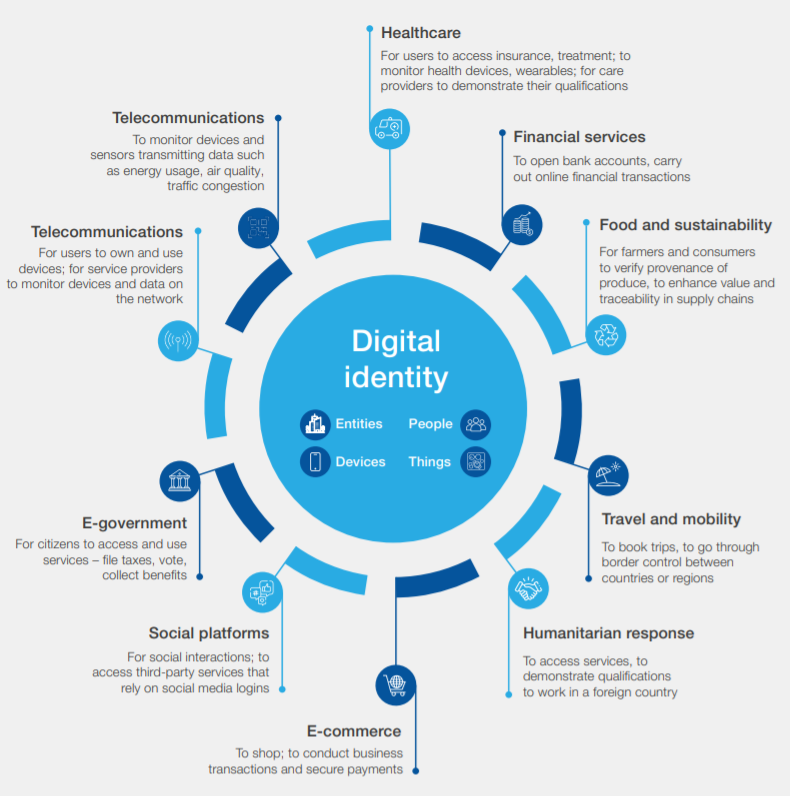
“This digital identity determines what products, services and information we can access – or, conversely, what is closed off to us” — World Economic Forum
One of the recommendations the B20 made to the G20 was to “support the design of policies aimed at promoting digital identities as a building block for data privacy and digital trust.”
Digital identities can be used to determine what products, services, and information are available to us, and they can give governments and corporations the power to incentivize, coerce, or otherwise manipulate human behavior under a system of social credit.
The G20 and B20 summits recommended and supported not just vaccine passports, but overall public and private digital identity schemes as well.
As editor Sikh for Truth points out in TruthTalk UK, “The globalists aren’t hiding their agenda anymore.
“For the ‘privilege’ of traveling, they want everyone to show their ‘digital papers’ and submit to an all-powerful digital ID system.”
The G20 is a forum comprising nineteen countries with some of the world’s largest economies, as well as the European Union (EU).
The countries are Argentina, Australia, Brazil, Canada, China, France, Germany, India, Indonesia, Italy, Japan, Mexico, Russia, Saudi Arabia, South Africa, South Korea, Turkey, the United Kingdom (UK), and the United States.
Your digital identity can be used against you in the event of a great reset
The digital identity push under the ‘great reset’ agenda risks enabling an authoritarian social credit system on a global scale: perspective

When a sweeping solution to a hyper-generalized problem oversteps the boundaries of personal privacy and liberty, the solution poses a greater threat to the people than the problem it proposes to solve.
As part of its “great reset” agenda to reshape the global economy, the World Economic Forum (WEF) wants everyone on the planet to be linked with a digital identity.
“This digital identity determines what products, services and information we can access – or, conversely, what is closed off to us” — WEF report
And while digital identities show great promise towards improving the livelihoods of millions, they are also used by authoritarian governments to profile and police citizen behavior under a social credit system.
The idea behind digital identities is simple enough. All the data collected from every online interaction you make with the private and public sectors goes into forming your digital identity.
This data can include your personal:
- Search history
- Social media interactions
- Online profiles
- Device location
- Medical records
- Financial ledgers
- Legal documents
- And more
As far as personal convenience goes, having a digital identity that consolidates everything into one place can be a godsend in that you can use your digital identity for a variety of goods and services wherever you go, and all of your data can be secured on the blockchain.
But, like with any technology, trust comes from knowing how it’s used, and knowing who benefits the most from the people who use it.
“With a few tweaks of code, blockchain can be corrupted by authoritarians to build social credit enslavement systems,” Trent Lipinski recently warned in the Coin Telegraph.
“If world governments legislate encryption technology for their own purposes and pervert consensus mechanisms for their own centralized enslavement systems, we will end up with digital currencies that can be used against the people of the world,” he added.
“What the Fourth Industrial Revolution will lead to is a fusion of our physical, our digital, and our biological identities” — Klaus Schwab, WEF
On the flip side, there are many ways of applying this technology for the good of humanity.
For example, last week, the WEF highlighted an app developed by Irish blockchain company AID:Tech, which helps people without official documents create personal legal identities.
However, there’s a big difference between identity and identification.
Providing a piece of identification to someone who didn’t have official documents to begin with is one thing; it’s an entirely different matter when the concept is expanded to including connecting every person on the planet with a digital identity that keeps a tamper-proof record of their behavior.
Identity encompasses everything that makes you unique, and your identity is what the WEF is really interested in.
Step out of line, and every social media interaction in which you partake, every penny you trade, and every move you make — can be used against you
According to a WEF report from 2018, “Our identity is, literally, who we are, and as the digital technologies of the Fourth Industrial Revolution advance, our identity is increasingly digital.”
Similarly, WEF Founder Klaus Schwab predicted that the Fourth Industrial Revolution would bring about the “fusion of our physical, our digital, and our biological identities.”
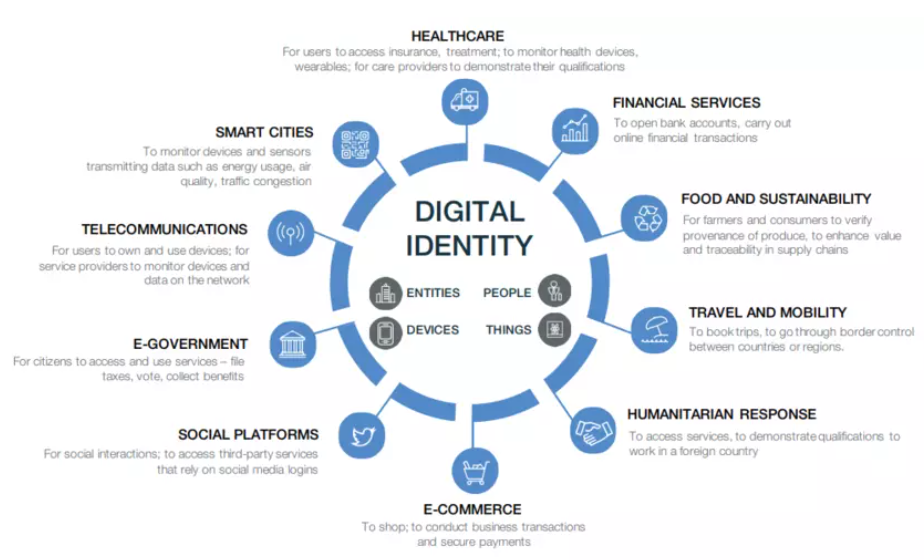
By connecting your every online/offline interaction, the WEF envisions your digital identity being linked to:
- Every click, comment, and share you make on social media
- Every financial transaction you record
- Your location and where you travel
- What you buy and sell
- Your personal health data and medical records
- The websites that you visit
- Your participation in civic functions (i.e. voting, taxes, benefits, etc.)
- How much energy you consume
- And more
Thus, your digital identity becomes an account of your social behavior, which can be policed.
“This digital identity determines what products, services and information we can access – or, conversely, what is closed off to us,” according to the same WEF report from 2018.
In other words, there will be a class system where people are given access to privileged information, products, and/or services based on the data recorded in their digital identities.
The Internet of Bodies “might trigger breakthroughs in medical knowledge […] Or it might enable a surveillance state of unprecedented intrusion and consequence” — RAND Corporation report
But what problem could possibly be so severe that its solution warrants cataloguing every individual on the face of the earth in such a sweeping way?
According to the WEF, the problem to be solved is “capitalism” as it relates to societal structures and the global economy.
The all-encompassing great reset is their proposed solution — a means to an end where everyone’s behavior is time-stamped and recorded on their digital identity.
But if you thought that your digital identity was just an app on a smartphone, wait until you hear how the WEF wants your digital identity to be connected to your physical body through the Internet of Bodies (IoB).
The IoB is an ecosystem consisting of “an unprecedented number of sensors attached to, implanted within, or ingested into human bodies to monitor, analyze, and even modify human bodies and behavior,” according to the WEF’s 2020 briefing on the IoB.

With the proposed Internet of Bodies, not only would your every societal behavior be recorded, but also everything you did in private.
Sensors that detect when you go to the toilet, where you sleep, your temperature, and even how fertile you are, will all be connected to the internet within the IoB ecosystem.
Now, who could possibly benefit from the massive consolidation of every intimate detail of your life?
According to a recent RAND corporation report, the IoB “might trigger breakthroughs in medical knowledge […] Or it might enable a surveillance state of unprecedented intrusion and consequence.”
The Chinese Communist Party (CCP) has taken the notion of the IoB to create an Orwellian surveillance state that pegs the digital identities of its “netizens” to a social crediting system.
From “deadbeat debtor” contact tracing apps that alert citizens with a warning whenever they come with 500 meters of someone who is in debt to the DNA phenotyping of over 1 million Uyghurs sent to “re-education” camps — the CCP is a living example of some of the horrible ways in which digital identities can be exploited.
Now, take a look at the strict lockdown procedures taking place across the world.
In some areas, you aren’t allowed to be out past curfew, you’re not allowed to buy or sell certain products, you’re not allowed to open your business, and you’re being told to wear a mask in your own home.
If you had a digital identity like the WEF proposes, the authorities would know the moment you broke curfew, went somewhere they told you not to, opened your business after they said shut it down, or let your mask slip down when they told you to keep it up.
The great reset is not a mandate from the people — It is a manufactured ideology concocted by a group of un-elected globalists trying to sway “stakeholders” into creating a new economy and social structure out of the destruction of the old
As far as a social engineering experiment goes, when people know that their every move is being recorded, they will police themselves into conformity.
Just knowing that they’re being watched will cause people to change their behavior, and this makes the job of the technocrat even easier.
When digital solutions are presented on a case-by-case basis for real-world problems that need immediate attention, companies like Aid:Tech have stepped up in a big way.
But when an all-encompassing solution to a vague, generalized problem like “the global economy” oversteps the boundaries of personal privacy and liberty, the solution constitutes a greater threat to the people than the problem it proposes to solve.
“Our identity is, literally, who we are, and as the digital technologies of the Fourth Industrial Revolution advance, our identity is increasingly digital” — WEF report
Digital identities can help better the lives of everyone on the planet.
But should society’s fate be mandated from the Davos elite?
After all, the World Economic Forum has been pushing for a great reset of the global economy and society for years.
And between 2018 and 2019, they staged two pandemic scenarios called “Clade X” and “Event 201” respectively, in which they simulated that the world wasn’t prepared for the next pandemic while recommending solutions that were in lock-step with the great reset.
Then in 2020, the pandemic magically represented “a rare but narrow window of opportunity” to carry out their plan.
Out of the coronavirus chaos, the elite began exploiting a global crisis to push their agenda with a top-down approach to governance.
The great reset is not a mandate from the people.
The great reset is a manufactured ideology concocted by a group of un-elected globalists trying to sway “stakeholders” into creating a new economy and social structure out of the destruction of the old.
To see the type of future they wish to impose upon you, take a look at this article from Time, “It’s 2023. Here’s How We Fixed the Global Economy,” which describes a technocratic Utopia where:
- The world embraced a “new normal”
- Governments used a digital revolution to improve public services, from digital health to e-cards, and create a citizen-centered welfare state
- COVID vaccine distribution was led by the WHO and the Bill and Melinda Gates Foundation
- European governments were eager to learn from DARPA to spur research and development in high-risk technologies
- The US shale sector was allowed to fail
- A new concept of a Healthy Green Deal emerged
- The concept of “social infrastructure” became as important as physical infrastructure
- The most valuable citizens were those who worked in health and social care, education, public transport, supermarkets and delivery services
If the un-elected elites get their way, you will own nothing.
You will have no privacy, and your every move will be linked to your digital identity as you await confirmation of approval or denial in collecting your benefits under a “citizen-centered welfare state.”
And you better do what you’re told because every action will be connected to your digital identity.
Step out of line, and every social media interaction in which you partake, every penny you trade, and every move you make — can be used against you.


No comments:
Post a Comment
Comments always welcome!